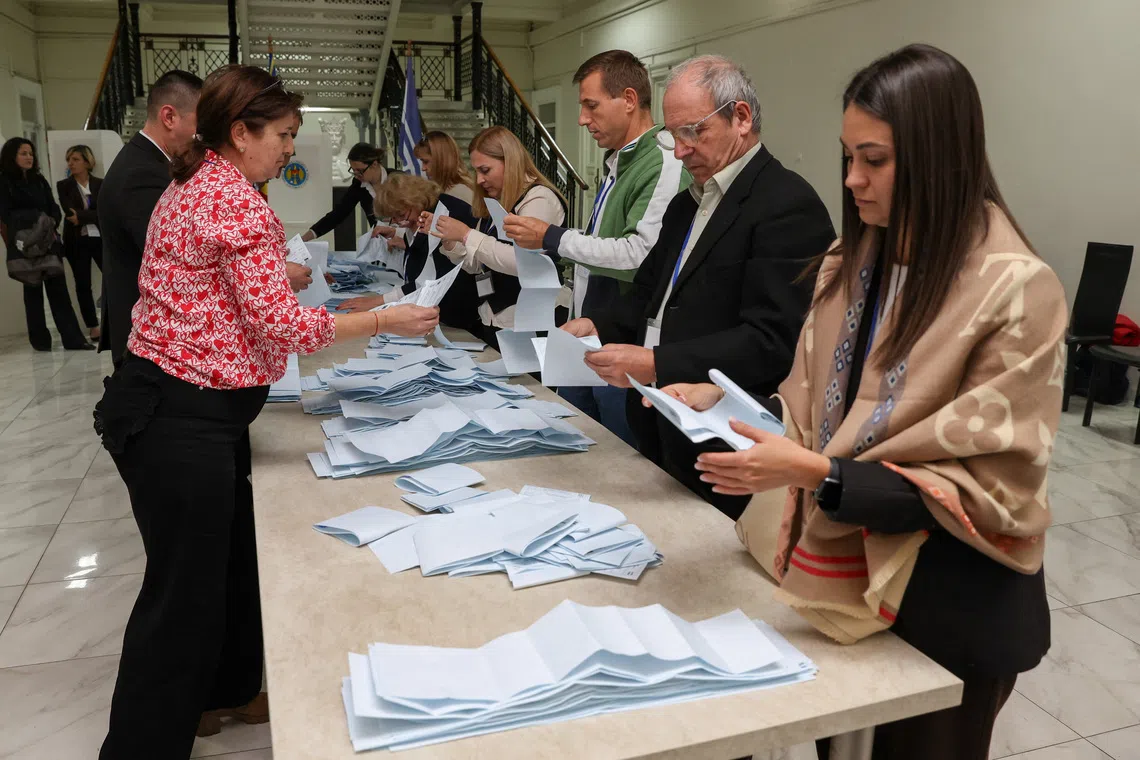Moldova’s pro-EU ruling party wins surprise majority in pivotal vote
Sign up now: Get ST's newsletters delivered to your inbox

Members of an electoral commission counting ballots after polling stations closed in Moldova’s parliamentary elections in Chisinau on Sept 28.
PHOTO: REUTERS
CHISINAU, Moldova – Moldova’s pro-European Union ruling party won a resounding victory over its Russian-leaning rival in a key parliamentary election, results showed on Sept 29, in an endorsement of Moldova’s bid to join the bloc and break free from Moscow’s orbit.
The surprisingly strong performance on Sept 28 by Moldovan President Maia Sandu’s Party of Action and Solidarity (PAS) against the Patriotic Bloc was a relief for the government and its European partners, who had accused Moscow of seeking to influence the outcome.
“I’m glad that our path to the EU is guaranteed... I want Moldova to be a free and democratic country,” Ms Sandu told a press conference.
With all votes counted, PAS won 50.2 per cent versus 24.2 per cent for the Patriotic Bloc, which had sought to steer Moldova – a small former Soviet republic wedged between Ukraine and EU member Romania – closer to Moscow.
“The people of Moldova... chose democracy, reform, and a European future, in the face of pressure and interference from Russia,” Mr Antonio Costa, president of the European Council which represents the EU’s 27 member states, said on X.
The leaders of France, Germany and Poland, in a joint statement, also congratulated Moldova for the “peaceful conduct of the election, despite unprecedented interference by Russia, including with vote-buying schemes and disinformation”.
Ukrainian President Volodymyr Zelensky said the election result showed that Moscow had failed to “destabilise” Moldova.
But Moscow, which denies the accusations of meddling, accused the authorities in Moldova of preventing hundreds of thousands of its citizens who live in Russia from voting by providing only two polling stations for the large diaspora.
Asked whether Moscow recognised the results, Kremlin spokesman Dmitry Peskov noted that some political forces in Moldova had spoken of violations.
“First, Moldovans themselves should probably sort this out. As far as we know, some political forces are declaring their disagreement. They’re talking about possible election violations,” he said.
First-time voter Ana-Maria Orsu, 18, said she had noticed that many young people like her had turned out to cast their ballot.
“I think we have a bright future ahead of us,” she said in the centre of the capital Chisinau early on Sept 29.
PAS leaders have called the Sept 28 election the most consequential since Moldova’s independence from the Soviet Union in 1991.
Ms Sandu’s government said Russia had attempted to sway the vote through widespread disinformation and vote-buying.
Patriotic Bloc co-leader Igor Dodon, a former Moldovan president, called for protests against the outcome of the election.
On Sept 29, a crowd of about 100 people gathered in front of Parliament where Mr Dodon said his party had filed documents to the Central Electoral Commission proving voting violations.
“PAS is clinging to power through the diaspora votes,” Mr Dodon said, referring to the large number of Moldovans who live and work in the EU and elsewhere.
He also said, without providing evidence, that more than 200,000 people living in Transdniestria, a pro-Russian separatist region, had been denied the chance to vote.
Ms Sandu rejected that criticism, telling reporters that Moldova could not influence what happened in a region that did not recognise Moldovan government control.
“We have done our best to provide the conditions for the people from the Transdniestrian region who have been genuinely participating in the elections process... to come and vote and they have been able to do that,” she said.
Ms Sandu added that Sept 28’s election had been fair.
Tugged east and west
Moldova – with a population of 2.4 million people that have been buffeted by the war in neighbouring Ukraine, alleged Russian interference and energy shortages – has long vacillated between Russia and Europe.
The Patriotic Bloc and other opposition groups had sought to tap into voter anger over economic pain and the slow pace of reforms – grievances worsened by what officials say has been widespread disinformation.
Inflation remains stubbornly high at around 7 per cent, while Moldovans also shoulder higher costs for imported energy.
Meeting the EU’s tough membership criteria will be very difficult for Moldova, one of Europe’s poorest countries.
Ms Anastasia Pociumban of the German Council on Foreign Relations called Sept 28’s election a vote of confidence in PAS and its EU plans but said the party faced a big challenge in “bridging the divides” in the country and better communicating the benefits of EU accession to more sceptical Moldovans. REUTERS


